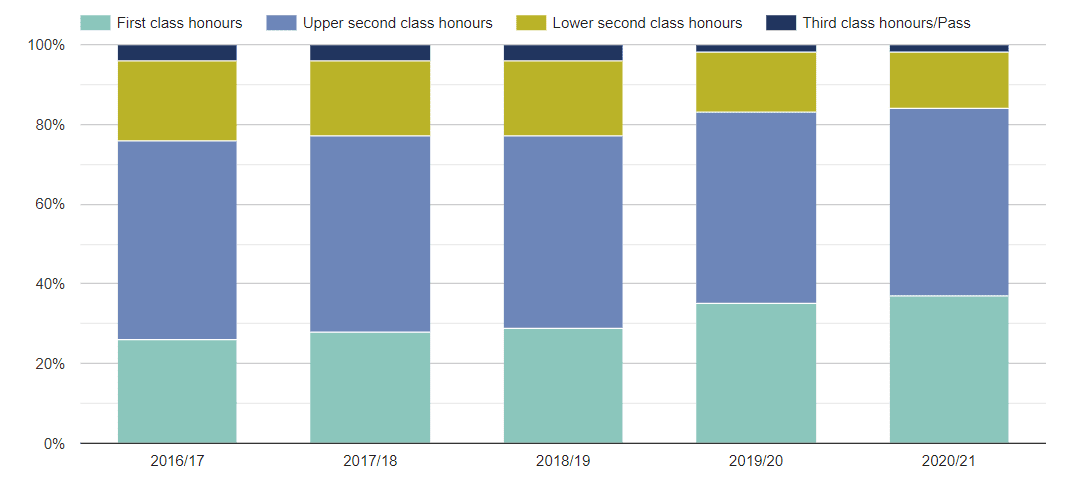Do you want a Student's guide full of the best tips on how to get a First at university? If the answer is yes, then you're in the right place.
Graduating with a first-class honours degree is one of every student's primary goals!
But usually, that means you will need to get 70% or more overall in your assessments and exams from UK universities.
So how do you smash your Uni goals and walk away on graduation day with the degree of your dreams?
As a former student myself, I know getting a first-class honours degree is at the top of many successful students’ lists!
So join me in this helpful article to discover more about how to smash your study goals and hit the top spot!
This post is all about how to get a first at university.
HOW TO GET A FIRST AT UNIVERSITY
To get a first class degree you usually need 70% or higher for your final degree classification. By graduating with the highest honours degree you can obtain during your undergraduate degree, you are putting yourself in a better position to achieve academic excellence. First class students stand a better chance of getting scholarships and financial aid. Getting the best grades, meaning a first-class degree can provide a great opportunity for your future with the potential for a higher-paying job.
Let's get straight into the details and start with the first thing to nail if you want to get that elusive first (1:1) and that's the importance of being truly organised!
1. Get organised

How to get a First - an Organised Desk // Photo by Jeff Sheldon on Unsplash
The most important thing to remember when aiming for a first is that you must be organised.
This means having a consistent approach to studying and ensuring that you dedicate yourself to the task at hand!
Make sure that you plan out your schedule in advance, making sure to leave plenty of time for revision and practice questions.
It sounds obvious, but with all the fun distractions you will encounter at Uni, it can be tempting to put your lectures on the back burner!
But of course, you should also aim to attend all lectures, tutorials, and seminars as this can help you make sense of complex concepts easier and faster.
More on getting organised
As I mentioned above, being organized can be the difference between acing your degree and coming in as a runner-up!
Set up an effective system for managing tasks such as creating timetables and setting deadlines.
This will help keep you on track and ensure that you're able to focus your energy on the right areas.
it's also really important to make sure that you dedicate sufficient time to studying each week and make sure to set yourself realistic goals.

How to get a first at uni - study goals // Photo by Estée Janssens on Unsplash
This could involve introducing new methods such as taking detailed notes or creating flashcards for key terms.
Doing research into different approaches may also throw up effective ways of learning and problem-solving that work perfectly for you! Try different ways and see which one works best.
I have a dedicated area on my blog with more info on how to ‘study smart’ so head over to discover more!
2. Academic performance
Before you can get a First, it’s important to understand what a first at university requires in terms of academic performance.
Generally, this means achieving high marks across all assessment pieces such as exams and coursework.
This also includes having an overall grade point average that exceeds the expectations of your degree classification (usually 70% or higher).
Ace the assessment criteria
It is also important to ensure that you are aware of the assessment criteria for any given module or course.
It’s worth reading through these thoroughly so that when it comes time to write an essay or take an exam, you know exactly what will be expected from you to aim high!
It is also important to forward plan when it comes to studying.
Create a study schedule and stick to it, setting yourself tasks and goals along the way. This will not only keep you organized but also help ensure that you’re covering every aspect of the course.
Take advantage of any feedback or advice given by your lecturers - this can be invaluable in helping you understand and excel at certain topics within your university syllabus.
As well as attending lectures, reading up on your chosen subject matter and using online resources such as blogs, online journals or videos to gain further knowledge.
Remember: when it comes to mark schemes professors are looking for a student's understanding on the topic.
The following table shows the entry requirements to obtain a first degree, upper second-class, third-class honours etc...in the UK:
Class of degree | Mark | Open University | Equivilant |
|---|---|---|---|
First class (1:1) | 70%- 100% | 85%+ | A |
Upper second class (2:1) | 60%- 69% | 70%- 85% | B |
Lower second class (2:2) | 50%- 59% | 55%- 70% | C |
Third Class (3rd) | 40%- 49% | 40%- 55% | D |
Fail | 0%-39% | 0%- 39% | E/F |
3. Make full use of additional resources
As well as making sure you physically attend all your lecturers, seminars, and so on, you should also try to make the best use of any extra resources available to you.
These could be course notes, and online lecture recordings
Hitting this extra resource up can be hugely beneficial as it allows you to revisit content that was discussed in class and provides the opportunity to reflect on topics more thoroughly.
4. Don't study alone!

How to get a first - study with friends // Photo by Brooke Cagle on Unsplash
Don't forget that studying doesn’t have to be done alone.
Joining student club and study groups with your peers will give you the chance to discuss the material with others who might have different perspectives or ideas.
Whilst also providing a great source of support when it comes time for revision.
This is also a great way of making sure that everyone understands the material better and can help with any areas that you may be struggling with.
Additionally, it can be a great way to stay motivated and stay on top of your work throughout the semester.
Also, make good use of any extracurricular activities or clubs available at your university.
This is an opportunity to be social and make contact with other students in your course who could also benefit from studying together.
For more advice on getting together with others, head over to my other helpful article.
Why Connecting With Others Is Important At Uni: 11 Best Tips For Making Friends at Uni
5. Take care of your well-being

How to get a first at university - health and well-being // Photo by Christopher Campbell on Unsplash
Don’t forget to look after yourself too! Taking care of your well-being at Uni is crucial to give you the best chance of getting that coveted First!
Sleep is also crucial! Make sure that you're getting enough rest so that you can stay focused during lesson times.
Eating healthily is also a great way to stay on top of your studies, avoid junk food as well as take regular breaks throughout the day - this will help make sure you’re not overworking yourself.
Taking a break every 45 minutes or so can help you focus better when you return to your studies, plus it will also give your mind some much-needed rest.
During these times, it's important to do something that you enjoy – socialising with friends and attending social events, going for a walk, or watching an episode of your favourite TV show.
These activities can provide the emotional boost needed to keep going through long study sessions.
Where possible also try to make time to get a little exercise every single day as it will help you stay on the ball and alert.
6. Spend less time on social media

How to get a first at university - stop wasting time on social media // Photo by Adem AY on Unsplash
With the rise of social media, it can seem like no one has the time these days to do anything other than endlessly scroll their feeds. But that's not going to get you a first- just the opposite.
Comparing yourself to others messes with your mental health and causes you more stress.
The only social media platform I would recommend is Youtube. It can be a great resource to aid in the learning process which leads to good grades.
However, a common mistake to avoid is spending countless hours down the Youtube rabbit hole. Watching one video after another.
Instead, use your spare time wisely. It is a good idea to get a social life and get off social media. A First class student knows how to balance having a good time with the challenges of university life.
7. Get support!

How to get a first at university - get support // Photo by Scott Graham on Unsplash
Having an effective support system around you will also be invaluable when it comes to getting a first – seek help from your lecturers and professors where appropriate, they'll have a lot of experience in teaching students who go on to get top results.
Taking advantage of study groups as I mentioned previously can also be beneficial as it allows you to discuss ideas with your peers and gain a different perspective on the subject matter.
Having someone to keep you accountable ensures that you stay on track with your studies. You won’t want to let your friends down, right?
8. Boss your reading!

How to get a first at university - keep on top of your reading // Photo by Thought Catalog on Unsplash
Keeping up with reading is essential when aiming for a first at university.
To stay on top of this, try to create a reading list before the start of each semester or term so that you know exactly what books are needed and don't run out of time.
It's also important to remember that effective note-taking can make all the difference in understanding material; taking notes while reading helps reinforce key points whilst improving recall later on.
Finally, remember that self-discipline is key to achieving a first-class degree and staying motivated.
Try to set yourself daily or weekly targets such as reading a certain number of chapters from your reading list, or attending a certain number of lectures.
Make sure you reward yourself when you meet these goals so that the task doesn't seem as daunting and overwhelming!
9. Chose topics that you care about

How to get a first at university - chose topics you care about // Photo by Campaign Creators on Unsplash
I'm sure you've heard the advice to choose a topic you are passionate about.
Well, passion is fleeting. What you feel passionate about this week, may change next week, or next month. Indecision leads to self-doubt, which naturally leads to a lower grade.
So instead of following your passion, instead choose a topic you CARE about.
Caring about something requires a lot of work, it's a lot more effort and so you'll be most likely to stick with it especially when it gets hard.
It doesn't matter if your science students studying the social sciences, or business administration. It doesn't matter if your international students.
When it comes to essay writing, exams or even dissertation time. You're going to want to pick a topic you have a good understanding of and care about exploring further.
10. Keep your eyes on the top-grade prize

How to get a first at university - keep your eye on the prize // Photo by MD Duran on Unsplash
Successful students who achieve the top grades know what they want to achieve in the first place and also know how to get it.
First class students are aware of how their professors will mark the piece of work that they've submitted. This means they know the mark schemes/ criteria and learning objectives that they have to hit for every module.
So they make a head start on their study time and consistently do their best throughout the academic year.
That is how the best students achieve the marks they need to graduate with a first class honours degree.
If you take anything away from reading this article, let this be it.
How do you find the marking criteria and learning objectives for your subject
The marking criteria and learning objectives will be given to you on your first day of class by your professors for every module you do.
You will get a module handbook where you will find the marking criteria at the back of the book. The learning objectives can be found at the front of every lecture note/ handout you will get per topic.
11. Track all your grades using a grade calculator

How to get a first at university - calculator your grades and keep track of them // Photo by Kelly Sikkema on Unsplash
As previously mentioned to get a first st university you need a total of 70% or more across all your modules.
Keeping track of your grades throughout the year will give you an idea of whether or not you are on track to achieve the degree classification you want and are likely to achieve a first.
I've linked below the two best grade calculators that I used myself when I was at uni. However, you will need to find out how much credit/ percentage each of your modules is worth.
For example, if you do 4 modules in a year, it could look like this:
- Module 1: 100% Exams/ or dissertation
- Module 2: 50% Exams, 30% Assignments and 20% Seminars
- Module 3: 50% Exams and 50% Assignments
- Module 4: 70% Exams and 30% Assignments
Free Online Grade Calculators:
What are your chances of achieving a first class?
According to new research by the higher education statistics agency, here is what the likelihood of you getting a first looks like.

Statistics for Likelihood of getting a First // Source: HESA
Focusing on the data from recent years: 2020/21. Taking in consideration the location (UK), Education time fraem (Full-time) and Gender.
- First class honours (37%) - 146,880 students got a first (1st).
- Upper second class honours (47%) - 184,485 students got a 2:1.
- Lower second class honours (14%) - 54, 315 students got a 2:2.
- Third class honours (2%) - 9,725 students got a 3rd.
12. Study SMARTER, not harder

How do I get a first at uni // Photo by Surface on Unsplash
Studying smarter, not harder means using your time wisely and some of the best ways to do this is by using effective study tips and techniques to get the best outcome you want.
How you study makes a significant difference to the marks you get. This involves using evidenced-base study techniques that actually work such as active recall and spaced repetition.
- Active recall- trying to retrieve the information stored in your head by testing yourself and asking yourself questions.
- Spaced repetition- this works by spacing out the retrieval of information, interrupting the forgetting curve so you can retain more information that gets stored in your long-term memory.
Watch this Youtube video about evidence-based scientifically proven study techniques from my favourite Youtuber Ali Abdaal.
“Finally, remember that self-discipline is key to achieving
a first-class degree and staying motivated”.
How to get a first at University – Final thoughts…
Achieving a First at university isn’t out of reach if you take the right steps to equip yourself with the necessary knowledge and skills.
Dedicate some time regularly to studying and make sure you absorb as much information as possible while attending lectures or seminars.
Don’t forget to use helpful resources such as past exam papers or lecture recordings and don’t shy away from seeking help or being part of a study group when needed. Putting in the hard work now will almost certainly pay off later!
Good luck! You can do it! And remember – even if you don't get the final grade you'd hoped for, there's no shame in having worked hard and tried your best. That's what really counts!










